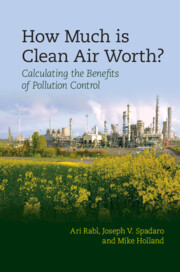Book contents
- Frontmatter
- Contents
- List of figures
- List of tables
- Foreword
- Preface
- Acknowledgements
- 1 Introduction
- 2 Tools for environmental impact and damage assessment
- 3 Exposure–response functions for health impacts
- 4 Impacts of air pollution on building materials
- 5 Agriculture, forests and ecosystems
- 6 Other impacts
- 7 Atmospheric dispersion of pollutants
- 8 Multimedia pathways
- 9 Monetary valuation
- 10 The costs of climate change
- 11 Uncertainty of damage costs
- 12 Key assumptions and results for cost per kg of pollutant
- 13 Results for power plants
- 14 Results for waste treatment
- 15 Results for transport
- 16 Lessons for policy makers
- Appendix A Nomenclature, symbols, units and conversion factors
- Appendix B Description of the RiskPoll software
- Appendix C Equations for multimedia model of Chapter 8
- Index
Preface
Published online by Cambridge University Press: 05 July 2014
- Frontmatter
- Contents
- List of figures
- List of tables
- Foreword
- Preface
- Acknowledgements
- 1 Introduction
- 2 Tools for environmental impact and damage assessment
- 3 Exposure–response functions for health impacts
- 4 Impacts of air pollution on building materials
- 5 Agriculture, forests and ecosystems
- 6 Other impacts
- 7 Atmospheric dispersion of pollutants
- 8 Multimedia pathways
- 9 Monetary valuation
- 10 The costs of climate change
- 11 Uncertainty of damage costs
- 12 Key assumptions and results for cost per kg of pollutant
- 13 Results for power plants
- 14 Results for waste treatment
- 15 Results for transport
- 16 Lessons for policy makers
- Appendix A Nomenclature, symbols, units and conversion factors
- Appendix B Description of the RiskPoll software
- Appendix C Equations for multimedia model of Chapter 8
- Index
Summary
The book is addressed to
Researchers interested in the calculation of environmental impacts;
Policy-makers and their advisors, in energy and environmental policy;
Graduate students and advanced undergraduates in environmental science.
In the past, decisions about environmental policy were made without quantifying the benefits. Pollution had become so bad, for instance with the Great London Smog of 1952 and rivers like the Rhine becoming too poisoned for fish to survive, that the demand for cleanup became overwhelming and environmental regulations were imposed in the absence of a cost–benefit analysis (CBA). The main sources of pollution and their impacts were obvious, and the regulations were clearly beneficial.
Nowadays, the remaining environmental problems tend to be more complex and so is the task of finding suitable solutions. For example, what should we do with our waste? Should what remains after recycling be incinerated or put into landfill, either method having some harmful impacts? Fortunately, environmental science has progressed to the point where the problems can be analyzed with a fair degree of confidence and CBA can help us to identify the best solutions. When cost-effective measures are proposed, CBA is a powerful tool for convincing concerned stakeholders that such measures should indeed be implemented.
Calculation of the damage costs of pollution (“external costs”) is multidisciplinary to the extreme, requiring expertise in engineering, environmental modeling, epidemiology, ecology, economics, statistics, life cycle assessment, and so on. This presents quite a challenge for the writing of a book on the subject. We do have a broad expertise in most of these fields, demonstrated by our publications in fields as diverse as economics, dispersion modeling, epidemiology, risk analysis, life cycle assessment, energy policy, waste treatment, and transport policy. We have been very active in all phases of the ExternE (External Costs of Energy) project series of the European Commission (EC), DG Research.
- Type
- Chapter
- Information
- How Much Is Clean Air Worth?Calculating the Benefits of Pollution Control, pp. xxix - xxxiiPublisher: Cambridge University PressPrint publication year: 2014



